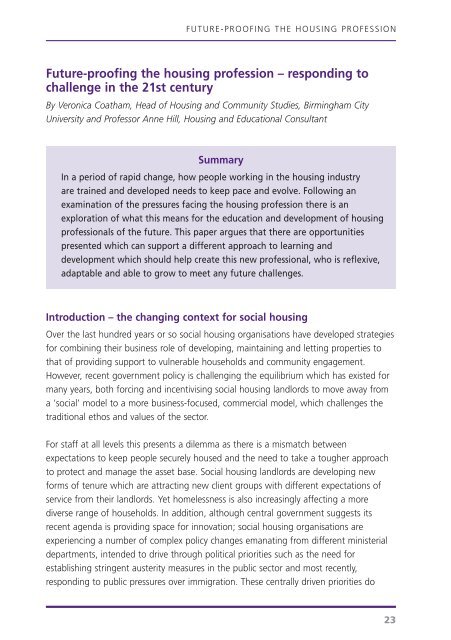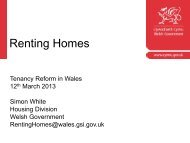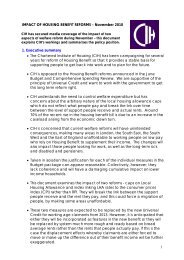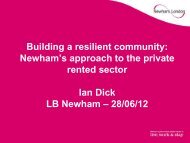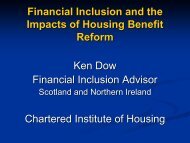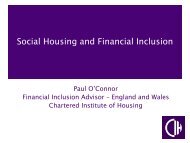View publication - Chartered Institute of Housing
View publication - Chartered Institute of Housing
View publication - Chartered Institute of Housing
You also want an ePaper? Increase the reach of your titles
YUMPU automatically turns print PDFs into web optimized ePapers that Google loves.
FUTURE-PROOFING THE HOUSING PROFESSION<br />
Future-pro<strong>of</strong>ing the housing pr<strong>of</strong>ession – responding to<br />
challenge in the 21st century<br />
By Veronica Coatham, Head <strong>of</strong> <strong>Housing</strong> and Community Studies, Birmingham City<br />
University and Pr<strong>of</strong>essor Anne Hill, <strong>Housing</strong> and Educational Consultant<br />
Summary<br />
In a period <strong>of</strong> rapid change, how people working in the housing industry<br />
are trained and developed needs to keep pace and evolve. Following an<br />
examination <strong>of</strong> the pressures facing the housing pr<strong>of</strong>ession there is an<br />
exploration <strong>of</strong> what this means for the education and development <strong>of</strong> housing<br />
pr<strong>of</strong>essionals <strong>of</strong> the future. This paper argues that there are opportunities<br />
presented which can support a different approach to learning and<br />
development which should help create this new pr<strong>of</strong>essional, who is reflexive,<br />
adaptable and able to grow to meet any future challenges.<br />
Introduction – the changing context for social housing<br />
Over the last hundred years or so social housing organisations have developed strategies<br />
for combining their business role <strong>of</strong> developing, maintaining and letting properties to<br />
that <strong>of</strong> providing support to vulnerable households and community engagement.<br />
However, recent government policy is challenging the equilibrium which has existed for<br />
many years, both forcing and incentivising social housing landlords to move away from<br />
a ‘social’ model to a more business-focused, commercial model, which challenges the<br />
traditional ethos and values <strong>of</strong> the sector.<br />
For staff at all levels this presents a dilemma as there is a mismatch between<br />
expectations to keep people securely housed and the need to take a tougher approach<br />
to protect and manage the asset base. Social housing landlords are developing new<br />
forms <strong>of</strong> tenure which are attracting new client groups with different expectations <strong>of</strong><br />
service from their landlords. Yet homelessness is also increasingly affecting a more<br />
diverse range <strong>of</strong> households. In addition, although central government suggests its<br />
recent agenda is providing space for innovation; social housing organisations are<br />
experiencing a number <strong>of</strong> complex policy changes emanating from different ministerial<br />
departments, intended to drive through political priorities such as the need for<br />
establishing stringent austerity measures in the public sector and most recently,<br />
responding to public pressures over immigration. These centrally driven priorities do<br />
23


